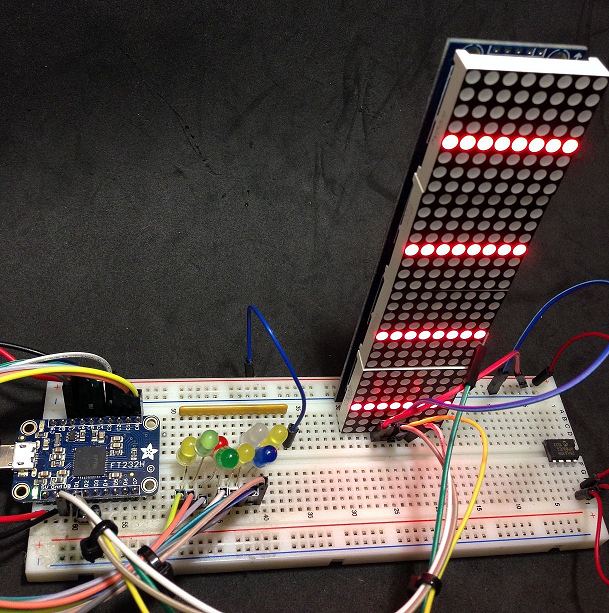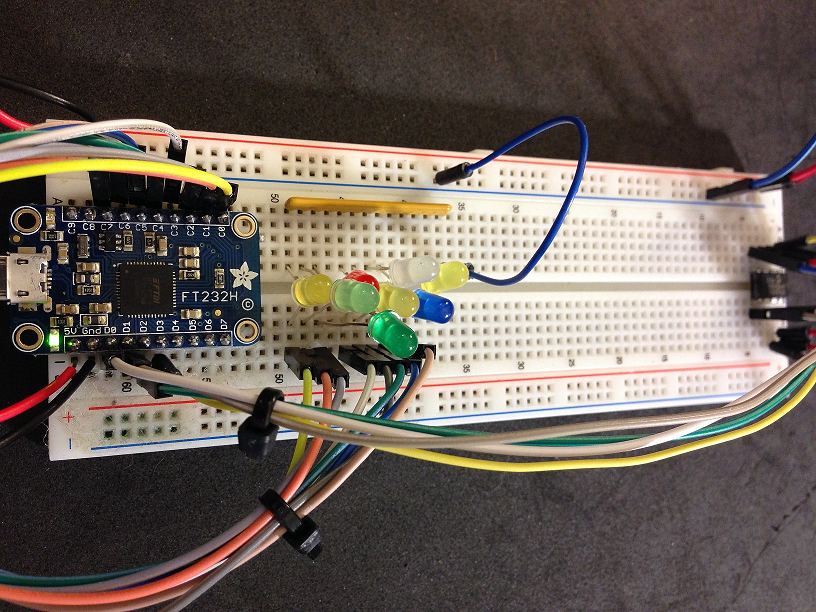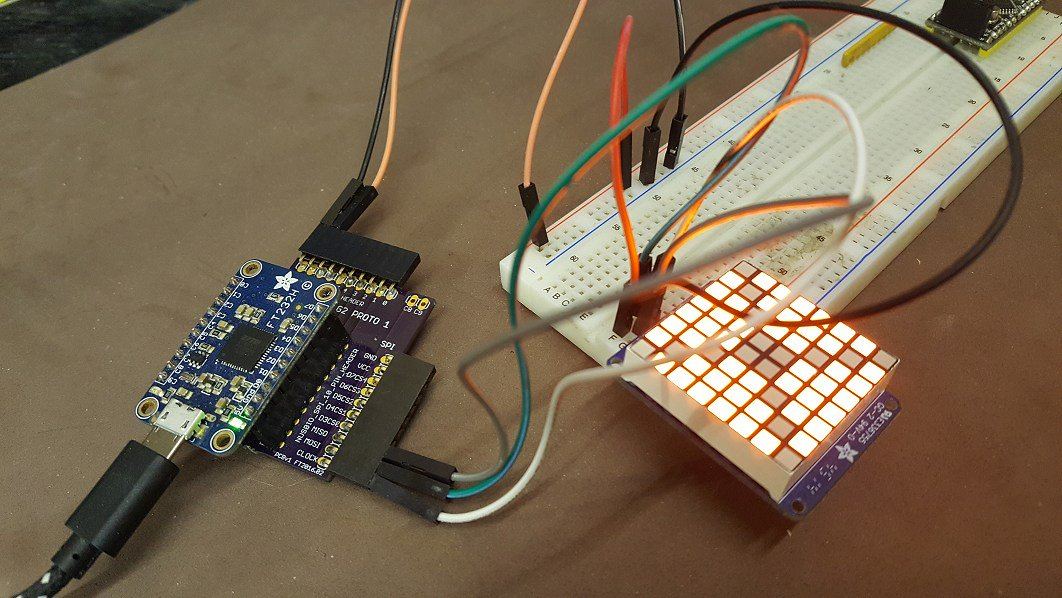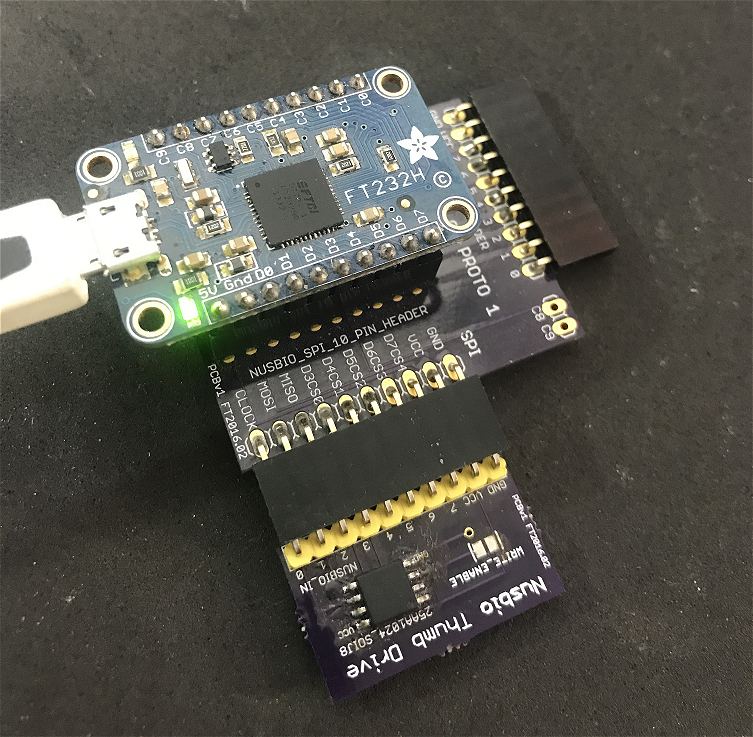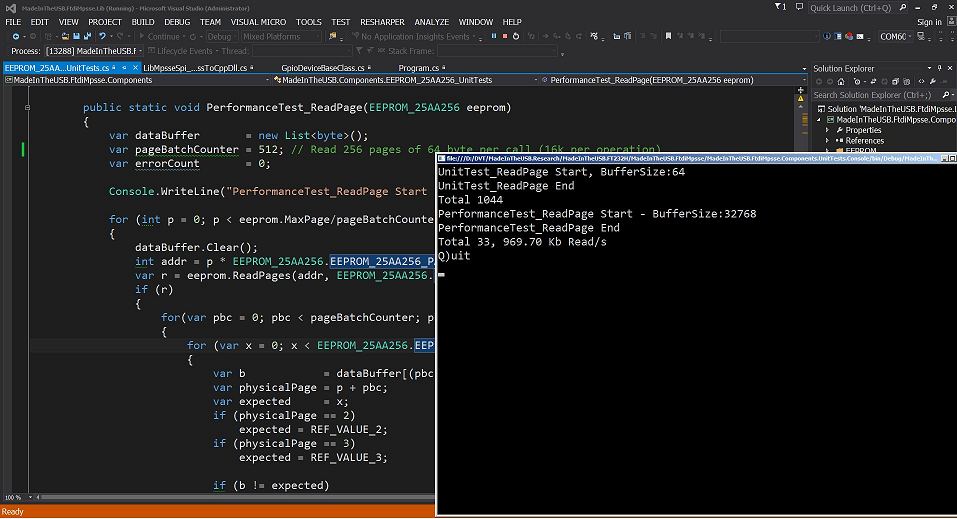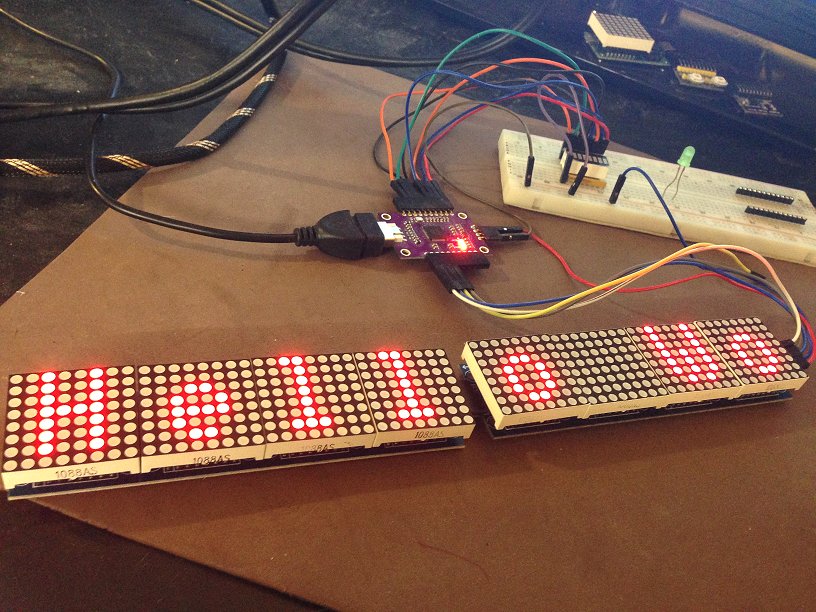*** The Library is a work in progress for now. Code is very messy ***
The .NET/Windows library FT232H.NET provides an abstraction to program
- The SPI protocol
- The I2C protocol
- The GPIOs
for the FTDI chip FT232H using the (Adafruit Breakout FT232H) or any other compatible breakout.
- RGB LED strip of type
APA102are supported with examples - 8x8, 32x8 and 64x8 LED matrix based on the
MAX7219chip are supported with examples - Any EPPROM and NOR and NAND Flash memory using the SPI protocol are supported with examples
- ADC MCP3008 and MCP3004 are supported with examples
- I created the library in 2017 and in 2023 I am going to update and extend it, as I am going to need ways to write and read FLASH Chip for my USB Mass Storage/FAT12 experimentations.
- As Adafruit improved their breakout, I want to add the support I2C and add more example using Adafruit's I2C devices
- The library uses the dll libMPSSE.dll
- The library uses the dll C:\Windows\System32\FTD2XX.DLL
- This DLL should get installed automatically by Windows as part the installation of the FTDI driver
static void GpioSample(IDigitalWriteRead gpios, bool oneLoopOnly = false)
{
var waitTime = 100;
for(var i=0; i < gpios.MaxGpio; i++)
{
gpios.DigitalWrite(i, PinState.High);
}
Thread.Sleep(waitTime);
for(var i=0; i < gpios.MaxGpio; i++)
{
gpios.DigitalWrite(i, PinState.Low);
}
Thread.Sleep(waitTime);
}
static void Main(string[] args)
{
var ft232Device = FT232HDetector.Detect();
if(ft232Device.Ok)
System.Console.WriteLine(ft232Device.ToString());
var ft232hGpioSpiDevice = new GpioSpiDevice(MpsseSpiConfig.GetDefault());
var gpios = ft232hGpioSpiDevice.GPIO;
GpioSample(gpios, true);
}static void CypressFlashMemorySample(ISPI spi)
{
var flash = new FlashMemory(spi);
flash.ReadIdentification();
System.Console.WriteLine(flash.GetDeviceInfo());
for (var _64kBlock = 0; _64kBlock < flash.MaxBlock; _64kBlock++)
{
System.Console.WriteLine($"Writing block:{_64kBlock}/{flash.MaxBlock}, {_64kBlock * 100.0 / flash.MaxBlock:0}%");
var r = flash.WritePages(_64kBlock * FlashMemory.BLOCK_SIZE, _64k0123Buffer, format: true);
if (!r)
System.Console.WriteLine($"Error writing block:{_64kBlock}");
}
for (var _64kBlock = 0; _64kBlock < flash.MaxBlock; _64kBlock++)
{
System.Console.WriteLine($"Reading block:{_64kBlock}/{flash.MaxBlock}, {_64kBlock * 100.0 / flash.MaxBlock:0}%");
var buffer = new List<byte>();
if (flash.ReadPages(_64kBlock * FlashMemory.BLOCK_SIZE, FlashMemory.BLOCK_SIZE, buffer))
{
var resultString = PerformanceHelper.AsciiBufferToString(buffer.ToArray());
System.Console.WriteLine(resultString);
}
}
}
static void Main(string[] args)
{
var ft232Device = FT232HDetector.Detect();
if(ft232Device.Ok)
System.Console.WriteLine(ft232Device.ToString());
var clockSpeed = MpsseSpiConfig._30Mhz; // clockSpeed = MpsseSpiConfig._10Mhz;
var ft232hGpioSpiDevice = new GpioSpiDevice(MpsseSpiConfig.Make(clockSpeed));
var spi = ft232hGpioSpiDevice.SPI;
var gpios = ft232hGpioSpiDevice.GPIO;
CypressFlashMemorySample(spi);
}
- The Adafruit breakout: Adafruit FT232H Breakout General Purpose USB to GPIO+SPI+I2C
- This breakout does contain an EEPROM therefore it is possible to program the device id, description or hardware properties.
- This breakout does contains a switch to switch the device in I2C mode and a Stemma QT I2C adapter
- This breakout IO are 3.3V (I think)
- This breakout is only $3 more expensive than the Chinese one.
Experimenting on a bread board with LED and EEPROM.
The Adafruit breakout plugged in my own adapter.
Programming with C# and Visual Studio.
- Chinese/eBay FT232H breakout
- This breakout does not contains an EEPROM therefore it is not possible to program the device id or description.
- SPI and GPIOs are working fine.
-
SPI
- CLOCK AD0
- MOSI AD1
- MISO AD2
- CS 5 Chip selects are available. CS0:AD3, CS1:AD4, CS2:AD5, CS3:AD6, CS4:AD7. The library is configured to use CS0:AD3 as the default.
-
I2C
- CLOCK AD0
- SDA OUT AD1
- SDA IN AD2
- SDA OUT and SDA IN need to be connected because in I2C there is only one data write.
- The data and clock wire each requires a pull up resistor (Not sure what value probably 4.7k).
-
GPIOS
- GPIO 0..7: AC0..C7.
- AC8, AC9 are special and not supported yet by the lirbary
- x64 : This code must be compiled in 64 bit mode
-
The dll FTD2XX.DLL, must be in the path. The dll should be installed by the FTDI driver. The driver should automatically be installed by Windows 10 on the first time the FT232H or FT232RL is connected to the machine. For Windows 7 install the driver manually.
-
This library contains the source code of the .NET wrapper for the dll FTD2XX.DLL. The file is called FTD2XX_NET.cs. This is the last version from FTDT as 2018, that support the FT4222H.
-
The dll libMPSSE.dll from FTDT must be in the current folder. It is part of the source code.
